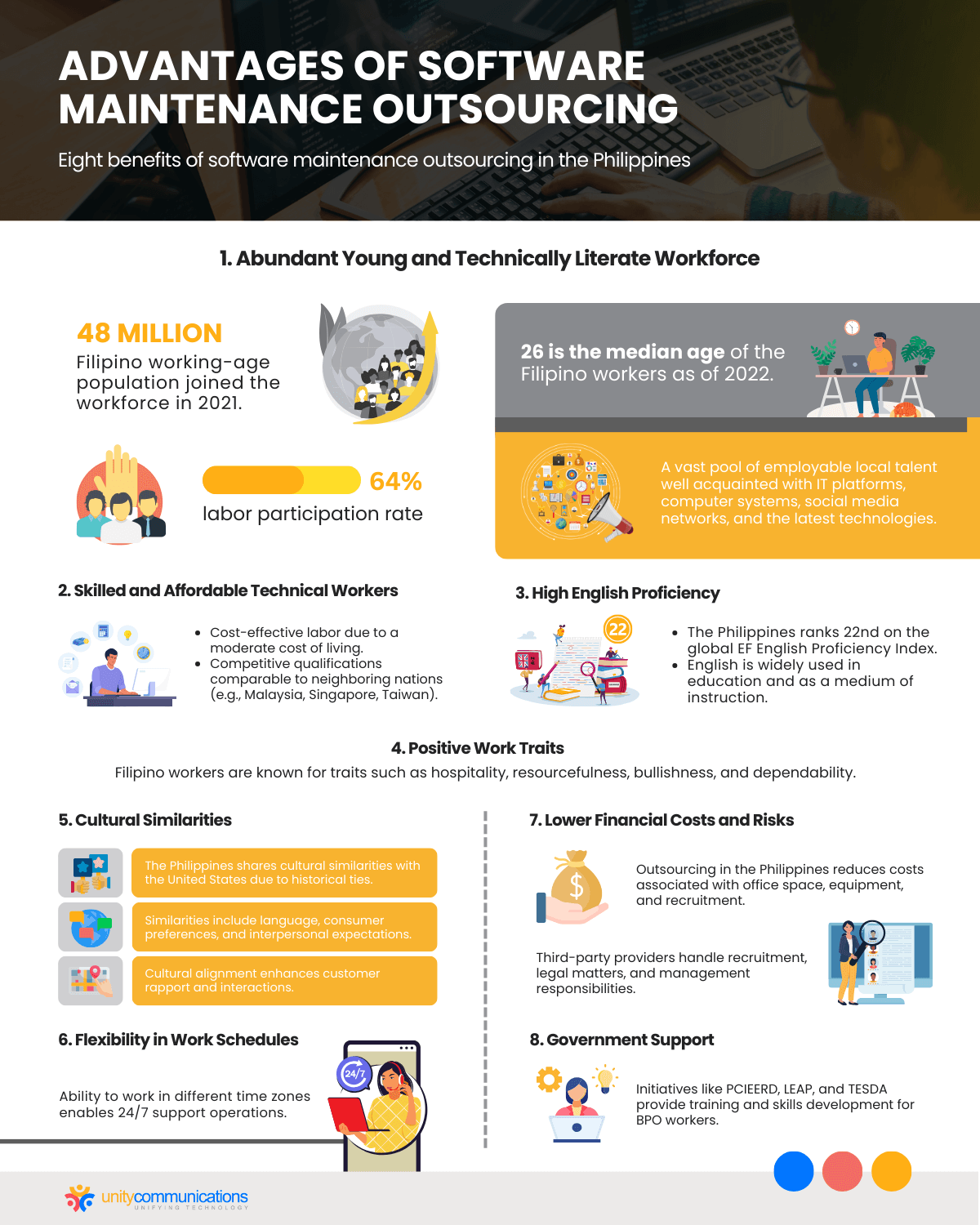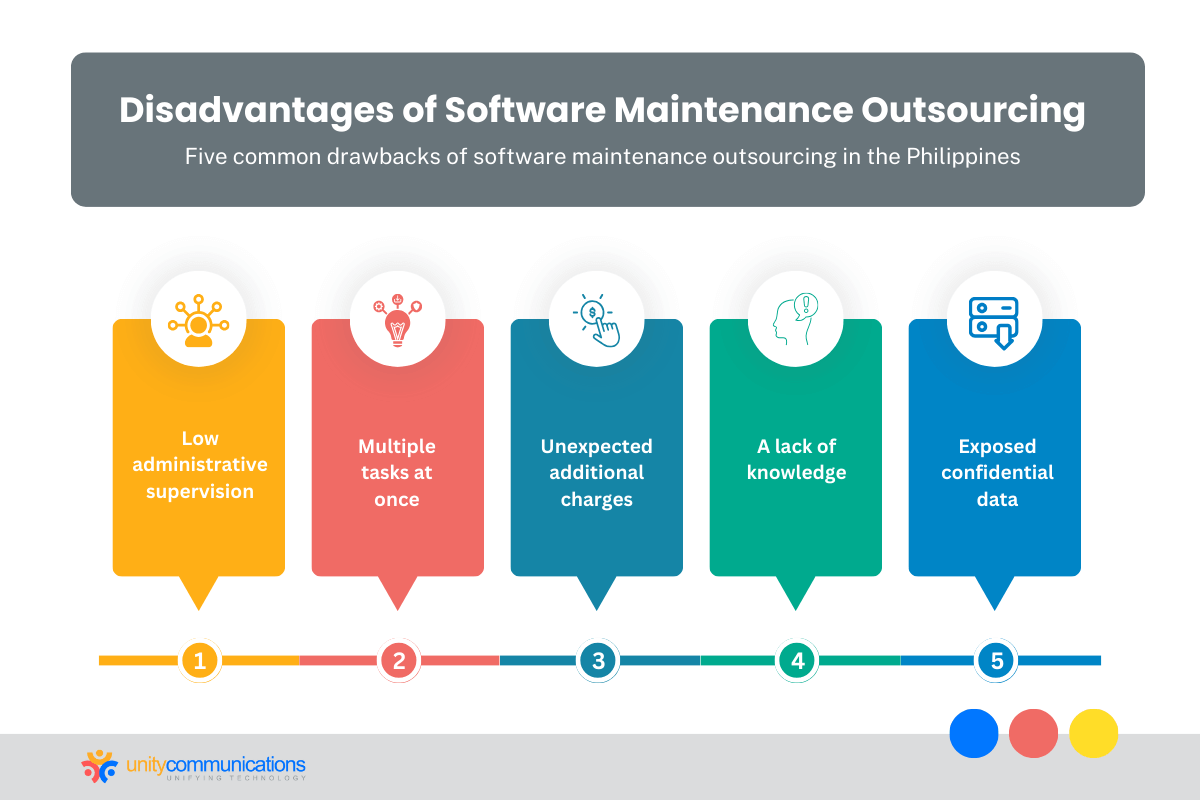Table of Contents
Established software and technology companies worldwide depend on offshoring providers in the Philippines to handle their back-end processes, including software maintenance.
This article is for companies and organizations interested in software maintenance outsourcing in the Philippines. Learn more about the business practice—what it is, its advantages and potential issues, and how to get the right outsourcing provider.
Read until the end to learn best practices when outsourcing software maintenance.
What Is Software Maintenance Outsourcing in the Philippines?

Software maintenance outsourcing in the Philippines means delegating to a third-party provider in the country the process of modifying, updating, and changing computer programs or applications to meet customer requirements. The business process outsourcing (BPO) provider handles software improvements after the client company launches the product.
The software product is sold to customers or users who contact the company through various communication means for inquiries, issues, or requests. The BPO provider’s technical support or software maintenance team interacts with the users to address their questions and technical concerns.
Technology companies resort to software maintenance outsourcing in the Philippines because they do not have the time to monitor the performance of their products in the market. They need a service provider that can regularly look for changes, repairs, and improvements to their software to stay relevant and competitive.
Types of Software Maintenance Outsourcing in the Philippines
The common types of software maintenance outsourcing offered in the Philippines are adaptive, corrective, perfective, preventive, web application, and mobile application maintenance.
Let us check the details:
- Adaptive maintenance involves changing software technologies and their policies and rules. This process includes changes in the hardware, operating system, cloud storage, and other information technology (IT) systems. The software must adapt to these changes to keep running properly.
- Corrective maintenance is when experts find and fix flaws in the current software product. The process eliminates bugs and comes with recurring and minor upgrades. This maintenance keeps the software functional and is frequently used to address typical user problems.
- Perfective maintenance adjusts the software by including new or enhanced features as required and deleting ones that are inapplicable or ineffective. This type of maintenance retains the product’s relevance and usefulness despite changes in the market or user needs.
- Preventive maintenance saves the IT system from any expected weak points. The process is proactive, and it involves future-proofing the software. This type of maintenance entails making necessary updates and modifications. It resolves seemingly minor issues that might turn into serious problems in the foreseeable future.
- Web application maintenance is when experts track security updates, check page speeds, operate backups, and update websites to keep a company’s website running smoothly.
- Mobile application maintenance provides on-demand and ongoing upkeep services for Android and iOS applications. This process detects and corrects bugs in mobile operating systems and apps to ensure they are compliant, user-friendly, secure, and responsive.
Advantages of Software Maintenance Outsourcing in the Philippines

Consider the benefits when opting for software maintenance outsourcing in the Philippines.
Ample Reserve of Young and Technically Literate Workers to Do Work
The current nationwide study puts the Filipino working-age population (between 15 and 64 years old) at approximately 75 million. Of these, nearly 48 million joined the workforce in 2021. The labor force participation rate (LFPR) is almost 64%, which means six out of 10 Filipinos are willing to work.
Members of this labor force mainly belong to the millennial and Generation Z groups. The median age of Filipino workers is set at 26 as of 2022.
These figures mean that when an organization chooses software maintenance outsourcing in the Philippines, it can avail of an abundant supply of young talent well acquainted with IT platforms, computer systems, social media networks, and the latest technologies. These young professionals are also amenable to working in different places and time zones.
A vast pool of employable local talent is favorable for service providers and their clients. A labor shortage is unlikely to occur soon. When the workforce is sufficient to address the needs of businesses, salary costs tend to remain steady in the coming years.
Skilled and Affordable Technical Workers for Reasonable Service Rates
The qualifications of the country’s workforce (e.g., technical competencies, educational levels, and soft skills) are almost the same as those of more developed neighboring nations, including Malaysia, Singapore, and Taiwan.
The outsourcing rates in the Philippines due to cost-effective labor is what gives it an edge. For instance, a Filipino working as a technical support agent earns between $300 and $500 monthly, based on work experience.
When shouldering minimal salary expenses, third-party providers operating in the Philippines can enjoy decreased total operating costs. Hence, they can provide their clients with high-quality tech support at an affordable rate, charging less than their high-salaried competitors abroad.
Another reason software maintenance outsourcing in the Philippines is more affordable than its counterparts is the nation’s moderate cost of living. The $300 to $500 monthly salary can almost satisfy a local professional’s essential needs, such as utilities, food, house rent, and transportation. Plus, the worker likely shares living expenses with a family member.
High English Proficiency for Better Customer Understanding
Many Filipinos are skilled in oral and written English communication. The Philippines regularly lands in the EF English Proficiency Index (EF EPI) and is classified as being in the “high proficiency” group.
The nation places 22nd on the global EF EPI ranking and is second only to Singapore in Asia. The top 20 come mainly from Europe’s more developed economies. This indicates that the Philippines’ quality of English is first-rate, with many Filipinos able to speak, read, and understand basic to advanced English.
English is the country’s second official language, next to Tagalog. It is a medium of instruction at all educational levels and in most schools. As such, many Filipinos can conveniently communicate using the language by the time they complete their formal schooling.
High English proficiency enables Filipino IT support staff to easily interact and collaborate with customers, clients, or users. Westerners contacting them for technical questions and assistance will hardly experience language barriers.
Solid English fluency makes software maintenance outsourcing in the Philippines attractive. Companies that rely on help desks, customer support, chat services, virtual assistance, and other back-office outsourcing processes constantly require English-speaking professionals.
Positive Work Traits to Assure Raised Efficiency and Morale
Companies can benefit from the local workers’ favorable attributes when selecting software maintenance outsourcing in the Philippines. Filipino workers have the following characteristics:
- Hospitality. This trait is what Filipinos are known for. They are naturally interested in others, especially foreigners, and are recognized for their warmth and friendliness. Local professionals serve customers and end users as much as they can.
- Resourcefulness. Filipino workers are typically hardworking, responsible, and passionate about their jobs. Many of them are creative and ready to improvise to deal with any challenges in the workplace.
- Bullishness. Most Filipino professionals are constantly positive because of their family and religious upbringing. They look at the brighter side of life, regardless of the situation. Such a rosy attitude favors the client company, as a local third-party IT team can retain productivity, customer relations, and teamwork in good or bad times.
- Dependability. Staff reliability is one reason software maintenance outsourcing in the Philippines is a good strategy. Filipino workers are quick learners and active listeners. They are empathetic and enthusiastic. They can also complete tasks and processes with minimal supervision when getting the hang of operations.
Cultural Sameness for Better Consumer Rapport
Outsourced operations, such as deploying a contact center as a service (CCaaS) solution, will have a better chance of success when only a few cultural differences exist between the end users and the third-party tech support agents.
The Philippines and the U.S. have many cultural similarities. The country was an American colony for nearly 50 years, from 1898 to 1946. Filipinos assimilated into Western lifestyles and cultures during that period, such as movies, food, fashion, music, consumer products, and services.
Filipinos were also educated and trained using American systems, including educational institutions, government structures, and legal processes, all recorded in English. Even signboards, signposts, billboards, and similar marks are written in English.
Moreover, Filipinos and Americans have comparable interpersonal expectations and practices, allowing them to relate to one another quickly. Similar religious beliefs, holidays, respect for elders, close family ties, ethnic diversity, and multilingualism are common examples.
Close cultural resemblance and high English fluency are another reason software maintenance outsourcing in the Philippines is a sound action plan. Local professionals can easily interact with Westerners about various subjects and build amicable relationships. The cultural agreement gives the country an advantage over its competitors.
Open to Varying Work Schedules for Nonstop Support
Filipino professionals in the BPO industry are open to working shifts for customer service, bookkeeping, accounting, human resources, or technical support outsourcing.
They are ready to work on holidays, weekends, and nights in different time zones. Weekend schedules and rotating shifts are acceptable to them and are standard job policies in the BPO sector.
In this regard, software maintenance outsourcing in the Philippines is ideal for businesses. A company can assign its in-house team to work during the day while its third-party software team continues the tasks in the evening. This setup enables the organization to have 24/7 operations.
Achieving nonstop software support operations leads to the following:
- Quicker resolution. 24/7 availability enables the in-house department and third-party agents to promptly resolve customer or user issues. Consumers’ waiting periods are reduced as the support team is constantly accessible to reply to calls and address technical concerns.
- Round-the-clock activities. The in-house staff and the third-party agents work together even though they are at separate sites with different time zones. This allows customers to contact the business regardless of time and location.
Fewer Management and Legal Duties to Lower Financial Costs and Risks
Software maintenance outsourcing is preferable to establishing a branch or office in the Philippines. The country’s labor code permits workers, under specific conditions, to set up labor parties for bargaining influence. Outsourcing will protect companies from the potential legal issues of direct employee hiring.
When delegating processes to the Philippines, the third-party provider deals with all recruitment activities, protecting clients from costly legal and management accountabilities.
Here are the benefits of letting a service provider manage hiring operations:
- Considerable cost savings. The organization no longer needs to spend more on extra office space and supplies, computer systems, furniture, and equipment. The BPO partner uses its own facilities and infrastructure when clients opt for software maintenance outsourcing in the Philippines.
- Qualified professionals. A BPO provider has a competent and skilled recruitment team to oversee job-related operations and resolve employment challenges. The team also handles and promotes work harmony and cooperation among third-party contractors.
- Extensive connections. A third-party provider has better access to local talent. It assists clients in picking the right candidates for outsourced tasks.
Steady Government Support to Spur Outsourcing Activities
The government’s solid support for the BPO sector is one of the main reasons to consider software maintenance outsourcing in the Philippines. The national government recognizes the outsourcing industry’s crucial role in providing jobs, launching new technologies, and contributing to tax revenues.
In the early 1990s, during the nascent stages of the BPO industry, the government formed the Philippine Economic Zone Authority (PEZA). The agency identified and established economic zones nationwide to give more priority to foreign investors.
In particular, offshoring providers that offer data entry services and other back-office operations put up offices in economic zones or IT parks to take advantage of tax exemptions and holidays. These privileges drive outsourcing activities and revenues.
Furthermore, the government introduced and promoted initiatives to spur subcontracting operations, such as software maintenance outsourcing in the Philippines. These programs include the following:
- The Philippine Council for Industry, Energy, and Emerging Technology Research and Development (PCIEERD) is an agency under the Department of Science and Technology (DOST) that offers training courses for BPO workers, such as programs to enhance service orientation abilities.
- Learning English Application for Pinoys (LEAP) is a software application financed by the DOST. It assists secondary and tertiary students to reach the BPO sector’s employment qualifications, such as above-average oral and written English capabilities.
- The Technical Education and Skills Development Authority (TESDA) offers free call center training and English proficiency courses for Filipinos pursuing a BPO career.
Disadvantages of Software Maintenance Outsourcing in the Philippines

The following are the issues that businesses might face regarding software maintenance outsourcing in the Philippines:
- Low administrative supervision. Delegating processes to a BPO provider implies that the client company must relinquish some control. The third-party provider normally applies its measures, protocols, and standards to operate and manage the outsourced activities. It will likely drop or sideline clients’ in-house methods.
- Multiple tasks at once. Some third-party providers assign one team to manage more than one client for cost reasons. Such a system compels team members to stretch their resources (e.g., time, skills, and effort) to serve the clients simultaneously. This might result in subpar service quality and performance.
- Unexpected additional charges. Some BPO providers charge their clients extra on top of the agreed rates for unforeseen incidents during outsourcing. These could be prolonged work interruptions or sudden employee layoffs. Companies must know such possibilities when choosing software maintenance outsourcing in the Philippines.
- A lack of knowledge. An internal department knows more about the company’s business, products, and services than a third-party team. While they are costlier to sustain, full-time staff members are more familiar with the organization’s activities. Turning over operations to outsiders might impact the company’s reputation.
- Exposed confidential data. Clients must share private and sensitive data when they outsource tech solutions, customer service, accounting, and bookkeeping processes to a BPO provider. They disclose credit card numbers, bank account details, passwords, and usernames that might be open to intrusion and hacking.
How to Get a Software Maintenance Outsourcing Provider the Right Way
Consider these methods when choosing software maintenance outsourcing in the Philippines.
Define Business Needs and Itemize Outsourcing Objectives
Develop a thorough outsourcing roadmap before working with a local service provider. Determine operational requirements and targets. Specify the reasons for pursuing software maintenance outsourcing in the Philippines.
Below are some examples of possible objectives:
- Be more flexible in dealing with sudden challenges.
- Build a broader and stronger market presence faster.
- Pay more attention to the core business to enhance existing services or products.
- Utilize the latest technologies and systems for a more efficient workflow.
- Slash operating expenses to have larger investible funds.
- Strengthen brand loyalty and customer retention for repeat business.
- Establish a more solid business to improve income.
Take note of these tips as well:
- Get the appropriate team size. The number of third-party workers needed is based on the task call quantity, number of processes, and work volume.
- Pick the communication channels to use. Determine the communication modes that end users often use. Common examples include live chat, email, self-service options, chatbots, messaging apps, phone calls, and social media.
List and Assess Potential Service Providers
Check out these pointers when seeking software maintenance outsourcing in the Philippines:
- Investigate security measures. The prospective BPO partner must harness advanced cybersecurity systems to protect crucial data about the company, its customers, users, and shareholders.
- Prefer a third-party team of specialists. Acquire a service provider with a specialized team dedicated to specific tasks. The right BPO partner can provide top-notch software maintenance services.
- Know the prospect’s outsourcing capacity. Research how long prospective service providers have been in business and the types of clients they have worked for. Favor candidates with subject-matter experts in industry standards, government laws, and security compliance.
- Perform an extensive background study. Gather as much information as possible regarding a prospect. Get a list of confirmed achievements or milestones and reviews from previous clients. Check reviews and testimonials from independent online sources besides the third-party provider’s website.
Request a Complete Rates List from Each BPO Candidate
To accurately measure the savings and costs of software maintenance outsourcing in the Philippines, ask for a detailed list of service charges from each prospect. Additional fees and hidden rates for a certain delegated task must be included.
Each BPO provider has a different pricing scheme than its competitors. Be meticulous, review each price, and perform a comparative study. Weigh the benefits and drawbacks of each outsourced software support service and compute the total costs.
After looking into each candidate’s expertise, background, and service rates, shorten the list of candidates. Narrow the number of prospects and exclude those that provide the least benefits.
Generate a Request for Proposal (RFP) for Short-listed BPO Providers
Draft an RFP and present it to each prospect. An RFP is a proven practice when planning software maintenance outsourcing in the Philippines. The document enables interested providers to bid by sending the client price quotations. A company can conveniently find the most acceptable service package based on its budget.
The RFP must contain the following information:
- Particulars of the outsourced software maintenance tasks, including the timeline and work volume
- Proposed budget for the processes
- Recommended solutions by the service provider concerning the tasks
Analyze each proposal received from interested service providers. Define the strengths, weaknesses, opportunities, and threats or risks. Choose the third-party provider with the best proposal and finalize the contract. The next step is preparing a service-level agreement (SLA).
An SLA is an official agreement and a vital document in software maintenance outsourcing in the Philippines. It details the services the new BPO partner must provide and guarantees that the terms and conditions to attain the outsourcing objectives will be met.
Monitor Outsourced Processes
Keep track of outsourced activities to ensure they align with the overall objectives. There are two methods used to gauge productivity, operations, and performance:
- Quantitative. Measure the third-party team’s efficiency and output using key performance indicators (KPIs) or metrics expressed in numbers and values. The standard KPIs are average response time, net promoter scores, customer satisfaction scores, and first response resolution.
- Qualitative. This pertains to the knowledge level of a third-party agent about the client’s services and products. Soft skills, such as problem-solving, creativity, analysis, active listening, and collaboration, are part of this measurement.
Sustain the Business Relationship with the BPO Provider
If software maintenance outsourcing in the Philippines is successful, building, retaining, and expanding the working relationship and business commitment with the BPO partner is ideal. Establish a long-term partnership if the service provider consistently meets expectations and hits targets.
Best Practices in Software Maintenance Outsourcing in the Philippines

Consider these tried-and-tested methods to make software maintenance outsourcing in the Philippines effective and secure.
Train and Upskill Staff for Better Data Protection
Ensure that third-party agents are regularly updated on software and data security.
Below are some security tips every business should adopt:
- Stay away from using paper documents as much as possible.
- Never share passwords. Fortify and change them regularly. Ask staff to memorize them instead of writing them down.
Comply with Government Policies and Industry Standards to Avoid Fines
Research what industry-specific regulations cover the outsourced processes. Meeting all government requirements is strongly recommended to enhance data and software security and avoid fines or penalties.
Examples of compliance regulations are the following:
- The Payment Card Industry Data Security Standard (PCI-DSS) is a security protocol that requires all businesses to process credit card information privately and securely.
- The General Data Protection Regulation (GDPR) is a privacy law in Europe that mandates all organizations doing business in the region to keep information secure.
Update and Strengthen Technology to Safeguard Data
Upgrade IT systems with advanced applications to protect software technology from online intrusions or possible cyberattacks.
Constantly load the networks and platforms with the most updated security patches. They will fix security holes found in previous versions and remove software vulnerabilities.
Use Multiple Authentication Protocols
Software maintenance outsourcing in the Philippines becomes more secure when businesses use various authentication procedures to confirm a user’s identity.
Check out some authentication protocols:
- Voice authentication permits certain technologies to analyze a user’s voice to confirm their identity.
- Knowledge-based authentication (KBA) is a security policy that identifies a user by asking the person to answer personal questions to gain access to activities.
- Multifactor authentication (MFA) verifies a user’s identity by receiving more than two verification parts from the person. For example, the user must accept a KBA and send a one-time password to a mobile device to log in.
Encode and Encrypt Software Data
Make sure to encrypt data to guarantee privacy. Encryption converts files or data into numbers, symbols, or a combination of both, making them unreadable. This technique offers an additional layer of security and lowers cyber intrusions since vital data is unclear.
The Bottom Line
Companies keen on delegating their processes to BPO providers should include the Philippines in their list of outsourcing destinations.
The country offers many benefits, such as reasonable service fees, a positive work culture, high English skills, and an ample supply of technically competent and young workers. Additionally, outsourcing enables companies to scale their operations, access the latest technologies, and provide customers with different communication modes.
Want to learn more about software maintenance outsourcing in the Philippines? Contact us, and let’s connect!




